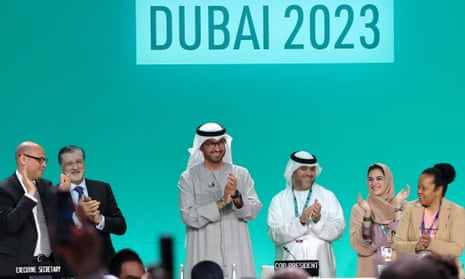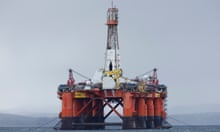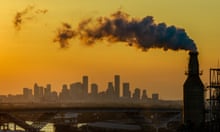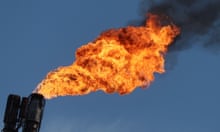Governments must not try to pick loopholes in the global agreement to “transition away” from fossil fuels reached last December, the UN’s climate chief has said, as he called for “torrents” of cash for poorer countries to tackle the crisis.
Some countries have sought to play down the significance of the deal reached at the Cop28 UN climate summit in Dubai, the first time that governments have made such a pledge on oil and gas.
Saudi Arabia’s energy minister, Abdulaziz bin Salman, told a conference last month that the “transition away” from fossil fuels was merely one choice on an “a la carte menu” of actions from the summit, an interpretation strongly repudiated by others.
Simon Stiell, the executive secretary of the UN framework convention on climate change, refused to single out any countries, but warned: “Hiding behind loopholes in decision texts, or dodging the hard work ahead through selective interpretation, would be entirely self-defeating for any government, as climate impacts hammer every country’s economy and population.”
The deal struck in Dubai sent “a very strong signal about the inevitability of global decarbonisation”, he told an audience of students and diplomats at the ADA University in Baku, the capital of Azerbaijan and the venue for this year’s Cop, on Friday.
Last year’s Cop focused on the need for countries to address fossil fuels as the key sources of greenhouse gas emissions. This year, the question of finance will dominate the agenda, which promises to be equally fraught.
Current levels of finance to help poor countries cut their emissions and cope with the impacts of extreme weather are widely recognised as far too low. However, there is little agreement on how they can be increased.
Rich countries are under pressure to pledge more assistance to the poor, but the sums that will eventually be needed dwarf anything likely to come from public budgets. Instead, countries are looking to innovative forms of finance, from the public and private sector, that can reach trillions in investment each year.
“We must spend the year working collectively to evolve our global financial system so it’s fit-for-purpose, with a clear plan to meaningfully execute the climate transition,” said Stiell. “It’s already blazingly obvious that finance is the make-or-break factor in the world’s climate fight.”
Without the “torrents, not trickles” of investment, the resolutions reached at Cop28 for countries to move away from fossil fuels would “quickly fizzle away into more empty promises”, he said.
Rachel Kyte, a former top climate official at the World Bank and adviser to the UN and governments, predicted a difficult year ahead for progress on the climate crisis, as more than 60 countries, covering more than half the global population, will hold elections in some form in 2024.
The results of the US election, and the campaigns, will have huge impacts on the UN Cop negotiations, as the likely Republican candidate, Donald Trump, took the first steps to withdrawing the US from the Paris climate agreement when he was last in office.
after newsletter promotion
Kyte warned: “That Cop29 will come at the end of a year with a majority of the world’s population going to the polls means that Stiell’s roadmap is confronted by a host of wars, sluggish growth and a political class in too many countries that has misplaced its sense of urgency. They have allowed climate progress to be portrayed by populists on the left and the right as a tug of war between the person on the street in the global north and the global south.”
This year is also likely to break global temperature records, as last year did. Heatwaves in the US and Europe last year would have been virtually impossible without the impacts of the human-made climate crisis, scientific research showed.
This year’s host country for Cop29, Azerbaijan, has not played a high-profile role in the global climate negotiations up to now. The country is highly dependent on oil and gas, which make up about 90% of its exports, and plans to increase its oil and gas production capacity by about a third over the next decade.
Mukhtar Babayev, the president-designate of Cop29, spent 26 years working for the state oil company. The Azerbaijani government made a major false step early in its preparations, by unveiling an organising committee of 28 top officials that was all male. After an outcry, the president, Ilham Aliyev, enlarged the team to 29 men and 12 women.
Stiell and his team will help Azerbaijan to run Cop29, acting alongside the presidency to guide the year of talks, culminating in a two-week summit in November, with more than 190 countries expected to attend.
A senior adviser to Stiell said: “Basically this speech is about getting on with the job, and for the executive secretary, being a neutral broker is central to that job. So giving this speech in Baku, rather than Davos or any other place, made sense for him.”









